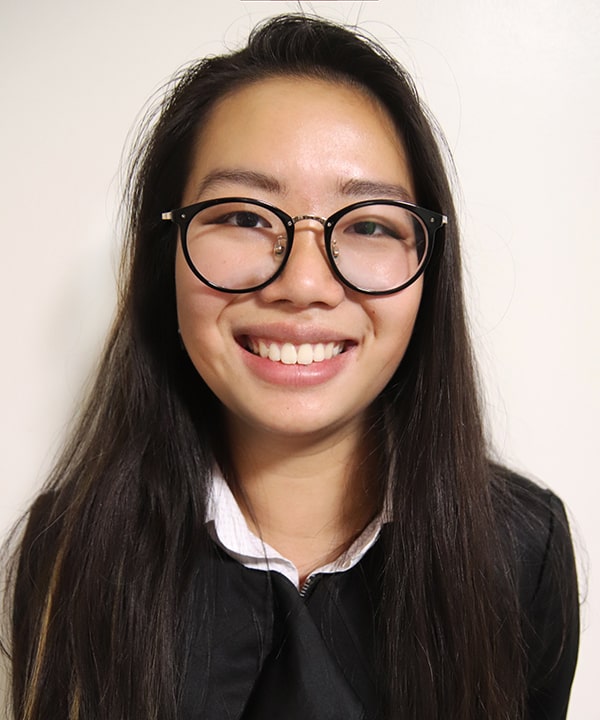Alumni Spotlight: Jay Liu
By Bill Brink
In high school, Jay Liu participated in a dual enrollment program at a local university. After Liu cited Andrew Carnegie’s article “Wealth” in a heated class discussion, a professor nicknamed her “Carnegie.” The moniker had an impact.
“Honestly, it’s the most arbitrary reason to apply to Carnegie Mellon, but it represented this intellectual curiosity that this professor wanted to nurture in me. As a first-generation college student, you were sustained by positive reinforcement from your community,” Liu said. “Applying to Carnegie Mellon was a tribute to him and the role models who encouraged me.”
Liu’s nickname-inspired application resulted in two degrees, study abroad experiences in China and Israel and a budding career in communications in her home state of New York. She graduated in 2020 with a Bachelor of Science in International Relations and Politics and Social and Political History and a Bachelor of Arts in Chinese Studies. She recently began a new position as senior associate at Argot Partners, a communications firm focused on the life sciences.
After receiving her acceptance to CMU, Liu knew she was at a crossroads. As the daughter of Chinese immigrants, Liu had always been interested in politics and international relations. She liked the fact that the CMU’s Institute for Politics and Strategy offered both a track into the Master’s program and a semester in D.C.
Liu’s first introduction to IPS was Geoffrey McGovern’s Decision Processes in American Political Institutions class.
“I strongly encourage anyone at Carnegie Mellon to take DPAPI, because it’s a very interesting way to think about determinism,” Liu said. “You go in thinking you know how politics work, and all the different factions shaping American society.”
But – spoiler alert – Geoff’s thesis with DPAPI is whoever has control over the institutional process, determines the result. That kind of class, regardless of your personal beliefs, challenges people to think critically about what they see in the world around them, even outside politics.
“A lot of the critical thinking and quantitative analysis skills that I was able to gain through the Institute for Politics and Strategy coursework put a different spin on understanding data and the context behind it,” she said.
Liu took that knowledge for a spin during the fall of her senior year, when she participated in the Washington Semester Program. As a full-time intern at the State Department, she watched the sun rise on the bus to work every morning, edited memos and press guidance behind the concrete walls of the Harry Truman building and headed to class in the evenings.
“As a result of my internships and four years at CMU, I underwent this process by which I was tempered from a really … I would hesitate to say arrogant, but yeah, I was a super cocky high schooler,” Liu said. “College taught me how many other smart people are out there and how many of those people are willing to mentor you. It teaches you how much you don’t know and how to ask questions and how to pick yourself back up.”
Liu’s first role out of college was at Abernathy MacGregor, a strategic communications firm based in New York.
“I never pictured myself in communications,” Liu admitted. “But when the pandemic hit the United States in March 2020, the pipeline for think tanks and government roles completely stalled.”
During nearly two years at Abernathy MacGregor, Liu counseled clients in support of transformative events including initial public offerings (IPOs), leadership transitions, mergers and acquisitions, shareholder activism, take-private deals and bankruptcies.
“Having my fingers in so many pies, I’ve really soaked up a lot of knowledge and built great relationships with different mentors, and I love that,” Liu said. “Knowing how much clients value the work that I and others on my teams do is a key reason I see myself staying in this sector.”
Liu enjoyed the breadth of industries her position at Abernathy MacGregor exposed her to, but wanted to specialize in STEM. At Abernathy MacGregor, Liu advised on deals reaching up to $20 billion in valuation. Her other past clients included a Fortune 10 pharmaceutical company, an investment fund focused on the life sciences and a FAANG (Facebook, Amazon, Apple, Netflix, and Google) company. In her next role, she wanted to become a subject matter expert and continue to work with C-suite executives.
She’s been with Argot Partners for several weeks and loves the opportunity to learn from and volunteer insights to new teams. Recently, a managing director asked her, in light of research around internet bots and Elon Musk’s proposal to purchase Twitter, how she would respond to a client who didn’t see as much value in using the platform.
“You always have to ask yourself, am I learning here? And I could have kept learning at Abernathy MacGregor, no question about it,” Liu said. “But getting out of your comfort zone, just as I did landing in Pittsburgh as an implant from New York, is how you figure out what you’re capable of. Now that I’m starting somewhere new, getting these hard-hitting questions, I have to think on my feet.”
Liu advises prospective students to visit campus and ensure that Carnegie Mellon fits their goals, because while the atmosphere can bring out the best in people, it is not for everyone.
“It does prepare you for the ‘real world,’” she said. “It does prepare you to learn how to learn, and quickly. The way that I problem-solved at Carnegie Mellon, I still use.”
